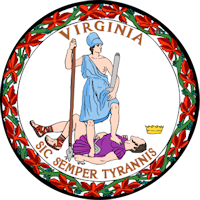Good news and bad news from the Mercatus Center if you, like me, lean libertarian in your thinking. In Mercatus’ newly published “Freedom in the Fifty States,” which ranks the states on public policy affecting freedoms in the economic, social and personal spheres, Virginia ranks ninth most free in the country.
Only ninth? In a state where the motto is “Thus Always to Tyrants?” Yes, only ninth. And we’re heading in the wrong direction. That ranking represents a decline of two slots since the last survey in 2007.
 But we can take some small consolation that we are less beholden to our political and bureaucratic overlords than most states on the East Coast. Remarkably, New Hampshire (motto: “Live Free or Die”) remains the freest state in the country — a beacon of light amidst the smothering Nanny State darkness all around it. Otherwise, the only other states east of the Mississippi that rank in the top 10 freest are Indiana and Virginia. Southern states tend to be free in the economic sphere, but more intrusive in the social and personal realms. Virgina follows that pattern, ranking 5th in economic freedom nationally but only 22 in personal freedom.
But we can take some small consolation that we are less beholden to our political and bureaucratic overlords than most states on the East Coast. Remarkably, New Hampshire (motto: “Live Free or Die”) remains the freest state in the country — a beacon of light amidst the smothering Nanny State darkness all around it. Otherwise, the only other states east of the Mississippi that rank in the top 10 freest are Indiana and Virginia. Southern states tend to be free in the economic sphere, but more intrusive in the social and personal realms. Virgina follows that pattern, ranking 5th in economic freedom nationally but only 22 in personal freedom.
Among the prime offenses in Virginia: aggressive asset-forfeiture laws, high liquor taxes, a high proportion of state/local employees in proportion to state spending, and extensive mandates for health insurance coverage.
Mercatus’ analysis of Virginia is worth reproducing at some length:
Virginia is, by our count, the freest state in the South. However, like the other states below the Mason-Dixon line, it fares better in terms of economic freedom (#5) than personal freedom (#22). The tax burden, government spending, and debt are all well below national averages. However, state and local government employment is essentially at the national average.
Gun laws are decent, with much room for improvement. However, open carry is allowed. Marijuana laws are largely unreformed.
Virginia is schizophrenic on education, requiring 13 years of mandatory schooling, including kindergarten attendance, and imposing significant standardized-testing and notification requirements on homeschoolers, but otherwise leaving both private and homeschools alone.
The state has below average numbers of arrests for victimless crimes, and its drug law-enforcement rate is also quite respectable (especially among its Southern peers). However, Virginia’s asset-forfeiture laws could really be improved.
As one might expect given its history with tobacco, Virginia’s cigarette tax is quite low and smoking is not banned in private workplaces. However, it does have some smoking restrictions. Moreover, its spirits tax rate is the third highest in the country. Labor laws are solid.
Like Hawaii and Pennsylvania, Virginia has no form of community rating for health insurance. However, coverage mandates are extensive. Indeed, Virginia has more than just about any other state, adding significantly to the cost of insurance.
Natural gas and cable have been “deregulated” to the consumer. The state has one of the best liability systems in the country, and it has improved on eminent domain since the last edition of the index.


